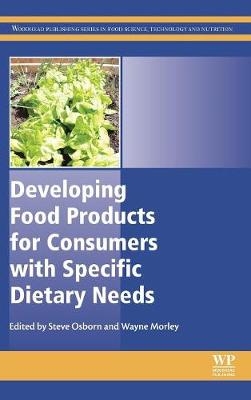
Developing Food Products for Consumers with Specific Dietary Needs
Woodhead Publishing Ltd (Verlag)
978-0-08-100329-9 (ISBN)
- Titel erscheint in neuer Auflage
- Artikel merken
From increased fat and sugar intake leading to higher levels of obesity, to greater levels of coeliac disease, the ingredients and nutritional content of food is becoming more and more important. Additionally, consumers are following particular diets for many different reasons, be it health related, or for religious or moral reasons.
The first part of the book looks, in detail, at the organizational structure required within a company to allow for the development of food products which meet the needs of these customers, while the second part presents a number of case studies highlighting the development of food products for various dietary requirements.
Precise coverage includes section on the development of low-sodium, low-sugar, low-fat, and low-carbohydrate products with the aim of producing healthier foods, as well as the development of organic and vegetarian products for consumers who are following diets for personal reasons.
The potential solutions for developing foods for customers who have specific dietary needs are likely to include both ingredients and technology developments. The ingredients area includes simple reductions as well as replacement strategies, whilst technology will be applied to both the ingredient itself and the host food product. All are aimed at maintaining the product quality as perceived by the customer.
Having graduated as an Analytical Chemist, Steve completed a Research Masters on Maillard Reaction Flavours, with the University of Reading. He then spent many years in Confectionery Manufacturing with Nestlé and Northern Foods, working as scientific and technical support to key brands, and later, Technical Manager at Ashbury Confectionery, a leading manufacturer of retailer and contract branded products. 2006 saw Steve join Leatherhead Food Research and with his wealth of industry knowledge and understanding undertook a wide range of activities for the Food Innovation group including; delivery of technical training courses and conference engagements on a wide variety of food innovation topics and running innovation workshops, including ‘Food Innovation INTENT’, an Open Innovation community. In 2015 Steve established The Aurora Ceres Partnership Ltd, with Naomi Diaz-Osborn providing innovation management, product development, change management and business support for the Food and Beverage industry, and continues to provide open innovation and technology scouting through ‘ACTION’, the Aurora Ceres Technology Innovation Open Network. Steve is a Chartered Scientist, Fellow of the IFST and chairs the Consultancy Special Interest Group. Wayne has a degree in Chemistry from Imperial College, London and a Ph.D. in Physical Chemistry from Salford University. He recently was appointed Group Head of Technical Innovation at 2 Sisters Food Group having previously worked as the Head of Food Innovation at Leatherhead Food Research. Prior to this he worked for 22 years with Unilever
Part I: Organization to allow for development of foods for customers with specific dietary needs 1. Differences between standard food product development and development of foods for customers with specific dietary needs 2. Techniques for the sensory and consumer assessments of products for customers with specific dietary needs 3. Market trends in products for customers with specific dietary needs 4. Organizational structure and business and technology strategy of food companies to maximize development of foods for customers with specific dietary needs 5. Opportunities for collaboration between companies in other sectors and food companies in developing foods for customers with specific dietary needs 6. Commercialization of foods for customers with specific dietary needs 7. Manufacturing and distribution of foods for customers with specific dietary needs 8. Retailing of foods for customers with specific dietary needs 9. Monitoring and evaluating the success of foods developed for customers with specific dietary needs
Part II: Case studies in developing foods for customers with specific dietary needs 12. Developing food products for customers with low sodium/salt requirements 13. Developing food products for customers with low fat requirements 14. Developing food products for customers following a low carbohydrate diet, including low fructose, low sucrose and low lactose diet 15. Developing food products for customers with low calorie requirements 16. Developing food products for customers with low cholesterol requirements 17. Developing food products for customers on a gluten free diet 18. Developing food products for customers following a high protein diet 19. Development of foods for consumers following a low-protein diet 20. Developing food products for customers with a specific food allergy 21. Developing food products for customers following a belief based diet 22. Developing food products for consumers concerned with physical activity, sports and fitness 23. Developing food products for customers following a vegetarian diet 24. Developing food products for customers following a vegan diet 25. Developing food products for customers following an organic food diet 26. Development of foods for consumers with fair trade and animal welfare concerns
Part III: Conclusions 27. Conclusions and future trends on food product development for customers with specific dietary needs
| Erscheinungsdatum | 20.05.2016 |
|---|---|
| Verlagsort | Cambridge |
| Sprache | englisch |
| Maße | 152 x 229 mm |
| Gewicht | 440 g |
| Themenwelt | Medizin / Pharmazie ► Gesundheitsfachberufe ► Diätassistenz / Ernährungsberatung |
| Technik ► Lebensmitteltechnologie | |
| ISBN-10 | 0-08-100329-3 / 0081003293 |
| ISBN-13 | 978-0-08-100329-9 / 9780081003299 |
| Zustand | Neuware |
| Haben Sie eine Frage zum Produkt? |
aus dem Bereich



